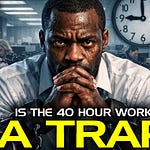The vision of African unity—between the diaspora and the motherland—has always been a threat to those who benefit from division. The powerful forces that shape the global economic and political landscape do not want to see a unified and self-sufficient Africa. When Africans and their descendants around the world come together to build, innovate, and collaborate, it challenges a system that thrives on Africa’s exploitation.
The Suppression of African Achievements
One of the most recent examples of this suppression is Burkina Faso’s President Ibrahim Traoré’s monumental achievement: the creation of an electric vehicle that also runs on solar power. Priced at only $7,500, this innovation represents a major step toward energy independence and sustainable development in Africa. Yet, instead of celebrating this achievement, we see videos about it being removed from platforms like YouTube and Rumble. France, which has long exploited its former colonies, does not want this success story to be widely known.
This is not an isolated incident. Kenya recently rejected vaccines suggested by Bill Gates, a man with no medical credentials, yet heavily involved in global health initiatives. Why is he, rather than African scientists and doctors, the face of African healthcare solutions? This is a clear example of outside forces attempting to dictate Africa’s future while suppressing its ability to develop its own solutions.
Why African Collaboration is a Threat to the West
For centuries, Africa has been deliberately fragmented. Colonial powers drew artificial borders to divide ethnic groups, religions, and cultures. After independence, neocolonial systems were put in place to keep African nations dependent on Western aid, Western financial systems, and Western technological advancements.
While Western nations do not always operate with unity—often engaging in wars and economic conflicts—they do collaborate when it benefits their collective power. The European Union exists despite deep historical rivalries. The United States and Europe work together to control global trade and resources, even when their interests clash. But when it comes to Africa, any sign of self-sufficiency is immediately met with resistance.
The suppression of African victories is not accidental. It is strategic. If Africans realize their potential and unite with their brothers and sisters in the diaspora, the economic and political power of the Western world would be threatened.
From "Unity" to "Collaboration"
The word unity has been a guiding principle for African liberation movements for centuries, but perhaps we need a shift in focus. Unity, as a concept, is powerful, but it often implies an emotional bond—a sense of family or brotherhood that may not always translate into action.
Instead of just calling for unity, we must emphasize collaboration. Collaboration does not require us to agree on everything or even like each other. It simply means working together strategically for a common goal. Western nations do not necessarily "unite" in a moral or emotional sense, but they do collaborate when it benefits them. Africans must do the same.
When Burkina Faso develops a solar-powered car, African engineers, business leaders, and investors across the continent and the diaspora should support and expand on that success. When Kenya rejects harmful policies, other African nations should back them up instead of standing alone. If we collaborate in economics, technology, agriculture, and defense, we will break free from the cycle of dependency.
The Spiritual Battle for Africa’s Future
Beyond the political and economic struggles, this is also a spiritual war. Many African traditions, as well as the Abrahamic religions, speak of deception, exploitation, and spiritual warfare. The forces that seek to control Africa use confusion, division, and manipulation to keep the continent and its people in a weakened state.
We must recognize the importance of spiritual clarity, wisdom, and discernment. African people—whether on the continent or in the diaspora—are not merely economic units. We are a people with a divine purpose, and that purpose has been systematically attacked for centuries. The first step toward reclaiming that destiny is to reject division and recognize the value of strategic action.
Rebuilding Africa’s Power
If we are to rise, we must:
1. Invest in Ourselves – Support African-led innovations like Burkina Faso’s electric vehicle. Buy from African businesses. Prioritize African solutions.
2. Control Our Narratives – Western media will not highlight African victories. We must use our own platforms to share information, celebrate our successes, and counter disinformation.
3. Build Economic Alliances – African nations and the diaspora must establish strong trade networks. We should create our own financial institutions rather than rely on the IMF and World Bank.
4. Protect Our Innovations – Patents, production rights, and African technological advancements must be safeguarded. Too often, our ideas are stolen or suppressed.
5. Reject Foreign Manipulation – From toxic aid programs to political interference, we must identify and resist foreign interventions that do not serve our long-term interests.
A New Dawn for Africa
The miracle in Burkina Faso is just the beginning. The forces that oppose African empowerment will continue to fight, suppress, and manipulate, but they cannot stop a people determined to rise. This is not just about the success of one nation—it is about the future of all African people.
We are not weak. We are not powerless. We are the descendants of the greatest civilizations, and it is time we reclaim our rightful place in history. The only question that remains is: will we collaborate, act, and build the future we deserve?












